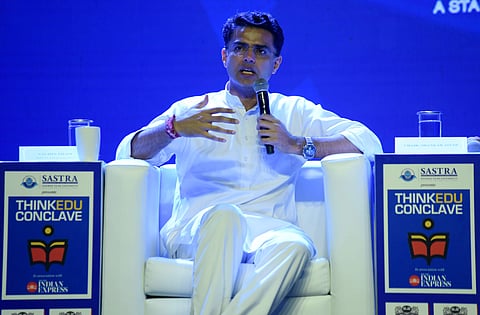

The day governments get voted in and out of power based on the state of primary schools in the state and other such issues, that day we will know our democracy is functioning well, Rajasthan Deputy Chief Minister Sachin Pilot said while speaking at the ThinkEdu Conclave 2020 on Thursday. The Minister spoke about the relationship between the state and the Centre and what challenges the political leaders of today face, among other issues, at the event.
"If I decide tomorrow that I want to bring down infant mortality, I can. All a person needs is determination, political will and commitment. We can say things like 'we have low resources and our schemes are not well-formed', but if a political leader sincerely decides to do something, I can assure you that we have the wherewithal to do it. If people believe in your cause, they'll support it," he said, while in conversation with Shankkar Aiyer, popular columnist and author.
He also passionately spoke about how it is impossible for us to move forward as a country, if we continue to have people living in abject poverty and starving every day. "Forty per cent of children under the age of five continue to be malnourished. This is a major part of our population. They have to be part of the country's growth story. I'm not trying to be a socialist but how can we move on when people are dying of hunger in our country?" he asked. He said that we have to come up with policies that will provide money to the poorest of the poor and also give them access to education, health and other welfare needs. "I think a deprived life is not something a politician should accept, no matter what his party is," he stated. He also added that boasting about a five trillion dollar economy when children are dying of starvation is disturbing.
"We have to be the best that we can as politicians. Issues like children, schools, women issues, safety — all these deserve human intervention. But in those cases, we want to pass the buck to someone else. If a programme/scheme is sincere, like the polio campaign, then people will willingly participate and that's how we became a polio-free country," he explained. He added that a politician's job is to get everyone on board and that what is best should be prioritised.
"When the government starts getting voted in and out of power based on issues like the quality of the midday meals and absence of Math teachers from a class, that is when real change will happen," he said. He reminded the audience that politicians are very smart people and that the minute they realise that a topic is becoming 'electorally important', then they will ensure that they take care of the issue. "I don't know a single government in India that has been voted out because the state of primary schools is bad. It just doesn't happen but that's how a democracy should function," he explained.
What is the point of being a Chief Minister several times, if they are unable to fulfil the basic task of a policymaker — to ensure a safe, secure and healthy life, he said. "No amount of obstacles or shortage of funds will stop people from coming forward to support a cause that is genuine. It would be a collaborate effort of the state and the society," he appealed.
Speaking about the relationship between the state and the Centre, Shankkar asked if non-BJP ruled states were the ones who were complaining more about not getting the required funds, "I don't think there is any state that is completely happy with what was promised to them and what they got. I guess maybe today it is not the time when they can stand up and say that they didn't get their share but it is wrong to say that only non-BJP ruled states are agitating."
The Minister who has been running the Rural Development and Panchayat Raj department since December 2018, spoke about the National Rural Employment Guarantee Act (NREGA) to give us an example, "The number of people employed on the last day of the BJP government was ₹9 lakh. I believe that if we have to handle the economic slowdown, I feel that we have to put money in the hands of people who will spend it on consumption items. If one gives a higher income to a farmer or a lower-middle-class family, they will go out to buy household goods and this is how we can get the economy back on its feet again," he explained.
"India is a consumption-based economy and so, if we want to give the economy a headstart, we have to give money to the poorest of the poor because they occupy the largest space in the spending community. People think that the NREGA is about freebies but we are creating real tangible assets in the villages. We build playgrounds, buildings and many physical assets. So in three months, we reach 35 lakh employees. Even with the same bureaucracy, same babus and same officers, we were able to achieve that in just three months. It all depends on priorities," he added.
If an NREGA employee doesn't get his salary within the 15th of the month, they are supposed to be paid with interest, Pilot said. "If you pay people three months late, then it's useless. Today, we are talking about everything else — JNU, the student movement, so on and so forth, but we are not talking about the price of onions, not about how people are saying that the economy won't even grow by five per cent. Unless we do that, we can't bring justice to current and future generations of India," the Minister said.
